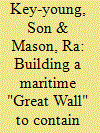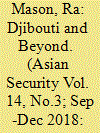|
|
|
Sort Order |
|
|
|
Items / Page
|
|
|
|
|
|
|
| Srl | Item |
| 1 |
ID:
123029


|
|
|
|
|
| Publication |
2013.
|
| Summary/Abstract |
In this article we aim to illustrate both the progress and the stalemates of the US and Japanese strategies to fortify the Okinawan Islands as a bulwark against China. As a conceptual tool to analyze the accommodation and resistance of militarization, we use the notion of a complex interplay of state, market, and societal actors, which showcases the process of mediating and recalibrating risks perceived by policymakers in Tokyo in response to the rise of China. In this process, risk has been shifted to individual stakeholders within society. We argue that the full-scale fortification of the Okinawan Islands will be hard to achieve because of the resistance of local residents and anti-base activists, as well as China's military and commercial strategies to circumvent any form of blockade.
|
|
|
|
|
|
|
|
|
|
|
|
|
|
|
|
| 2 |
ID:
161510


|
|
|
|
|
| Summary/Abstract |
Having passed successive legislation in the past two decades to expand its use of the Japan Self Defense Force (JSDF), Japan has emerged from its post-war ‘pacifist’ shackles to assume a range of security roles that are typically associated with so-called ‘normal nations’. This article addresses how these have been crystallized in the form of an indefinitely-termed overseas base on the Horn of Africa, in Djibouti. Careful examination of pertaining Diet minutes, media discourse and government ministry papers suggests that the risks identified with this facility’s realization and status have been fundamentally recalibrated, allowing its presence and operational diversification to go largely unnoticed and unopposed – both domestically and overseas – despite representing a seemingly radical departure from common sense interpretations of Japan’s antimilitarist constitution.
|
|
|
|
|
|
|
|
|
|
|
|
|
|
|
|
| 3 |
ID:
185566


|
|
|
|
|
| Summary/Abstract |
The research problem this article addresses is whether the unique confluence of overseas security forces in a single territorial space through the leasing of land for foreign military bases compromises the state's sovereignty. We study Djibouti's practice of renting land to military powers from an analytical position that is diametrically opposed to the literature on the ‘scramble’ for Africa and often erroneous assumptions of an erosion of sovereignty. Using the concept of ‘worlding’, we argue in this article that instead of reading ‘military base diplomacy’ as eroding and undermining Djibouti's sovereignty, this case demonstrates the ways in which ‘the art of being global’ underpins new forms of territoriality and unexpected forms of locality in Africa. Consequently, we maintain that African experiences of sovereignty offer the challenges, along with the rewards, of greater analytical depth to International Relations scholarship while expanding our understanding of different empirical cases beyond the western-centric accounts of sovereignty in line with an abstract ideal that does not tell us much about the world, postcolonial experiences and global politics. Through a case-study approach, we focus specifically on the stark distinctions between Japan and China, which both have their respective first postwar overseas military bases in the country, and the Djiboutian state itself, in terms of how each are interpreting and practicing sovereignty to fit their own national narrative, international status and domestic legal frameworks. The findings challenge simplistic analyses of African states as victims of exploitative Great Powers, gradually and repeatedly being stripped of their sovereignty.
|
|
|
|
|
|
|
|
|
|
|
|
|
|
|
|
| 4 |
ID:
167211


|
|
|
|
|
| Summary/Abstract |
This article re-examines the often misrepresented role of Okinawan agency by focusing on the divergence between mainstream framings of Okinawa, actual policies directed towards the Ryūkyū Islands and the sociopolitical reality on these outlying islands. In so doing, it interrogates the various narratives of Okinawa and the key terms that have articulated them in the post-reversion era. It thereby adds explanatory power to extant structuralist and critical literatures, which have tended to suffer from monolithic descriptions of structural power and polemic approaches to American and Japanese governance of the islands. Specifically, by analyzing a series of illustrative issue areas such as sexual and economic exploitation, environmental protection and military security, the article uses an adapted form of critical discourse analysis (CDA) to trace how framings and policy have shifted since reversion to Japanese rule. This concentrates primarily on prime-ministerial statements from the National Diet and other, mostly Japanese-language, materials relating to Okinawa’s governance. These are contrasted with short case studies highlighting the disconnection between rhetoric and reality. Ultimately, the evidence points to a decoupling of mainstream narratives from the on-the-ground reality. The article thereby provides a nuanced understanding and expression of Okinawa’s complex interests and agency.
|
|
|
|
|
|
|
|
|
|
|
|
|
|
|
|
|
|
|
|
|